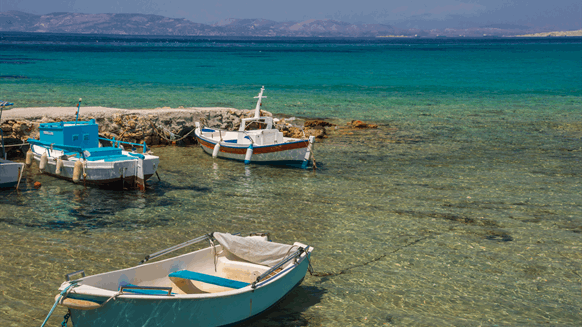Millions of barrels of Russian crude and fuel have been swapped between tankers a few miles off the coast of Greece, one of a number of solutions traders have used to get around European Union sanctions against Moscow.
At least 23 million barrels of Russian crude and additional volumes of refined fuels have been transferred from one tanker to another in Lakonikos Bay since the start of the year, according to Bloomberg tanker tracking. Greek authorities say their scope to intervene is limited because the activity takes place outside a six-mile limit in the country’s territorial waters in the area.
Traders and shipping companies have found a multitude of ways to ensure that Russian oil can flow and this is just the latest example. There has been similar activity near Ceuta, a Spanish enclave in North Africa. A vast shadow fleet of oil tankers has also emerged to help the country overcome sanctions.
Shifting cargo at sea, known to traders as ship-to-ship transfer, or STS, requires several key services to take place safely. EU companies can only offer these services if the cargo on board is purchased at or below a Group of Seven maximum price. The government was not immediately available to comment on what checks it does.
Once the cargoes are switched, the receiving tankers will transport the oil thousands of miles to buyers in Asia.
Greece is the world’s largest oil tanker-owning nation and when the EU was negotiating a cap on Russian oil prices, the country was among those pushing for higher thresholds. The country was also among those pushing for weaker restrictions on the transport of Russian oil when the relevant measures were discussed.
Many of the vessels involved are old and their insurance is unclear. The average age of tankers involved in crude oil transfers outside Greece is 18 years. The oldest one involved was built in 1997. This compares with a wider fleet of tankers whose average age is around 12 years for the size of ship most used to carry Russian crude.
Ship-to-ship transfers are not inherently risky, but they do involve two ships floating at sea pumping a potentially polluting cargo from one to the other.
The bay is home to a sea turtle protection project, while a nearby estuary provides feeding and breeding areas for birds.
Spanish example
Earlier this year, after it became known that ship-to-ship activity was occurring near Ceuta, Spanish authorities sent a letter to local maritime service companies to remind them of the ban on provide fenders for STS if it involved Russian oil, or suspected Russian oil. oil, even in international waters. The main opposition party asked the government to stop the activity.
EU rules state that companies must carry out due diligence, as well as check and collect certificates proving that oil cargoes are bought below the price cap. The authorities should also carry out inspections and checks on companies.
Typical services in the business include the provision of fenders to prevent damage to the vessel or the environment, cargo masters and sometimes specialist pilots.
Still, the penalty for non-compliance is light, providing limited disincentive for owners and companies not to help move Russian cargo.
–With assistance from Prejula Prem, Jack Wittels, Sherry Su and Sotiris Nikas.


